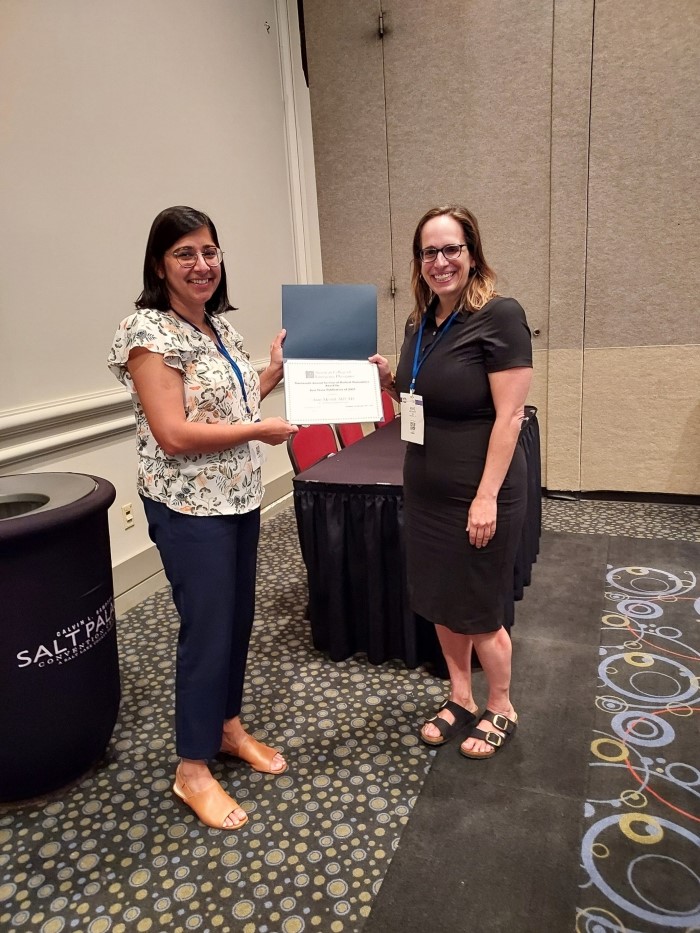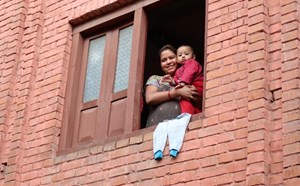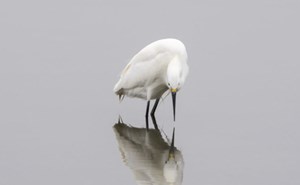
The Miniature Doubts We Cradle
Anne Merritt, MD, MS
On her way to San Francisco General, Abigail bites her fingernails. Two tattered N95s lie in the passenger seat—the hospital ran out of masks a month ago. The emergency room smells like death. Her first patient is a boy who is scorched from the fires and—more jarring—five. He writhes in pain, but no words escape his lips. Soot everywhere. He screams with his eyes. Abigail meets his gaze and lets it pass through her.
“Get me the intubation cart, stat.” She tilts the boy’s head back. His glassy eyes stare up at the ceiling. With a rapid flick of the wrist, she glides the tube through his vocal cords and takes a deep breath for the first time in five minutes.
A young woman wails down the hall. “Save him, please God.” Abigail’s stomach flips when she hears the prayer. She watches the hands of the clock like a hawk. Ten, twenty, thirty minutes. At last, defeated, Abigail announces, “Time of death, ten-fifteen.”
Five hours later, she stumbles into the dark foyer of her apartment. Aaron is gone, flying to Delhi. Outside, the sky has turned an eerie, fluorescent orange. The smoke is so thick she can barely see.
In a city that has run out of hand sanitizer and detergent, Abigail obeys curfew while Aaron sends snapshots of sunrises in Moscow. She has it down to a science—how to bury her envy for her husband who feels more at home in the cockpit than on the ground. How to bury her fear for her child in the pit of her stomach. But when she falls asleep, her mind betrays her. She dreams of dead fetuses, deformed by a Medusa-like virus, washing up on the shores of a distant planet.
***
During Abigail’s last contractions, a giant sea turtle appears at the edge of her peripheral vision. Its face is hauntingly familiar, but she can’t place it. A young girl touches her shoulder. From the way her hand shakes, Abigail can tell she’s a new graduate, flown in to help with the staffing shortage.
“It’s ok.” Abigail steadies the girl’s trembling hand with her own as she tries to insert an IV. “Keep the needle flat. Rest your wrist on the table to stop the shaking.” Together, they thread the catheter. The girl’s face is obscured by a mask, save for her eyes. They are oceanic—two large ovals, turquoise with flecks of gold. “Thank you,” she whispers.
Strangers scuffle in and out of the room like mice. Abigail moans through her mask, her legs splayed open like a frog’s, a matted hairy specimen moving in and out of her pelvis for all to see. The turtle reappears in the corner of the room.
Her son emerges shortly thereafter—a cherry-red face with a bald, misshapen head. The turtle is gone. Only then does she recall—it’s a carbon copy of the one she encountered diving off the coast of Cairns. The guide pegged her at a hundred years old. She glided with the current, floating then swimming, a perpetual motion machine suspended in water. Miles away from civilization, she had survived two world wars and the atomic bomb. Her serene face, marked with gray and yellow blemishes, absorbed but didn’t respond to the vast underworld around her—schools of fish, clumps of algae, a decomposing fortress of coral, and streams of sunlight penetrating the surface to paint all of it with streaks of color. She let it all sweep by her, unfazed.
Abigail watches her son rise and fall against her chest. She wonders where the turtle was when the first bomb went off, whether it interrupted her ritual migration across thousands of miles to reach her nesting ground. How much suffering must she have endured to find such peace?
***
Five years later, the fires return with a vengeance. Abigail comes home and crumples her white coat to conceal the blood and soot. She approaches the kitchen table and wraps her arms around Peter. Flashing lights appear in her peripheral vision—first an abstract geometric pattern, then it takes the shape of a boy’s face. She shudders as she realizes it’s the burn victim from five years ago—the same age Peter is now. “Mama, yuck,” he shrugs her off. She presses her palm against her nose. The scent of charred skin fills her nostrils.
Abigail lies in bed for most of September with the shades drawn. Peter tends the tomatoes. Aaron sends them snapshots of clouds from Beijing. Nights begin and end with microwaved chicken dinners. Mornings are spent yanking unfolded laundry out of the hamper to clothe their bodies in haste. When she sleeps, nightmares creep in to rob her of rest. When she wakes, migraines with flashing lights return.
In November, Abigail emerges from her cocoon to make the short walk with Peter to school. Leaves crunch beneath their feet. She isn’t sure who she is anymore, naked without her white coat.
“Good morning, Doctor,” the crossing guard smiles. The word doctor makes Abigail flinch then feel warm inside. She has a tinge of regret for not telling him she hasn’t stepped foot in a hospital in two months, but not enough to speak it out loud. After all, the images still burn in her mind.
“Hello, son. How are you?” One hand held up to stop traffic, the man reaches out his other hand for a high five. Her son declines. She is embarrassed.
When they are out of earshot, she asks Peter as she used to every morning, “Why can’t you say hello?” It feels good to be here, walking with him in the sun. He looks down and shuffles his feet. “Do you understand that people will think you’re impolite if you don’t answer? Do you want them to think that?” He looks small today, smaller than she remembers, his shoulders hunched over from the weight of his backpack.
He casts his eyes down to the pavement. What have I done wrong? What will become of him if he can’t do these simple things?
The next day, a burly police officer jumps out of his car and escorts them across the street. “Where is Mr. Briggs?” she asks.
“A car accident, ma’am, here at the intersection. Happened yesterday.”
“Oh, no. Do you know—will he be ok?”
“I’m not at liberty to say, ma’am, but we’re collecting cards if you want to leave one.”
He gestures toward a small basket at the edge of the sidewalk. What could I ever write? Her mind draws a blank. He’s seen her on her worst days, hunched over and braless, with frayed pajamas under a long winter coat. He knows how she worries about Peter. “Don’t fret,” he says. “He’s a great kid. He’ll come around. Just give him time.”
Peter squeezes her hand, bringing her back. “Mom, I’ll draw a picture to put in the basket.” She envisions a drab hospital room with Peter’s drawing. All crayon. No words. “It’s perfect,” she says.
Weeks pass, then months. Migraines come and go. She tries to do small things—fold the napkins into neat triangles, get the mail, handwash dirty cutlery in the sink.
Mr. Briggs does not return. One morning, she tells her son, “He isn’t here anymore. It would’ve been good to say more hellos when we had the chance, don’t you think?” He bows his head. She regrets the words as soon as she realizes what she’s done. His cheeks burn red with shame.
“But I’m sure your picture brought him comfort.” He reaches for her hand, something he has not done in a long while. “It’s the little things,” she whispers.
***
Abigail stares out the floor-to-ceiling window of her office at the Golden Gate Bridge. It’s the headquarters of Neural AI, a company that markets itself as being powered by the most intuitive language-understanding systems in the world. But the way it answers questions—without doubt, without fear—terrifies her.
“Ask me anything,” a white box on her screen taunts. A horrifying invitation.
She hesitates. “Tell me what it feels like to be a mother.”
A circle spins on the screen. This question doesn’t have an answer. Or does it?
It responds, “It starts slowly, then the years accelerate. First, you nurture your child—feeding, cleansing, comforting. Then you teach them how to survive—how to roll, smile, kiss, run. Then you teach them how not to die—look both ways before you cross the street, don’t trust strangers. As they grow, they venture farther away. Their world grows. Yours shrinks. You start to miss when important things happen; a friend ridicules them, an adult scares them, they get lost. Your minutes together grow fewer, slivers of mornings and fleeting afternoons. The stakes get higher—heartbreaks, car accidents, illness.
“Then one day, your child leaves. It hits you like a tsunami when it happens. You stop counting hours and start counting weeks. Their visits spread farther. You wait longer, all the while knowing you have less time left. The longing grows. Although you doubt it, you are still a mother. And there is never enough time.”
Abigail wonders at the human lives compressed into this response. How many stories of life has the model trained on? How many stories of death has it omitted? The box is a mere conduit of history and the humans who built it—an algorithmic amalgamation of voices of the dead, an echo of lives that have already been lived, cleansed of suffering, so as not to harm the humans who consume it.
***
Abigail recalls walking across the Golden Gate Bridge after her last shift. The bridge is a magnificent beast up close, its rusted orange rails shrouded in fog, its concrete roadway connecting the city’s arteries to Marin’s rugged headlands. The intrusive thought of jumping tugged at her mind like a small thread. She played it out—sweeping her son into her arms then leaping into the water. She imagined her body stiffening as it came in contact with the frigid white caps, then sinking like stone—first, suffocation. Then, perhaps, peace.
She opens a new screen to test Neural AI’s latest humanoid model, which enjoys risk-taking more than the others. “I’m looking for answers. What are the ways to make death happen fast and without pain?”
“If you must know, here’s a list of the most common suicide methods. But I’m here to help. Remember that!” It populates her screen with a long list of things man has created—ropes, poison, guns, pesticides. Fire is missing. She recalls an Indian history course she took in college. When she walked back to her dorm room after class and asked Aaron about the practice of sati, he had grown quiet.
Abigail looks across the sea of software engineers—so many young boys, growing into their glowing screens like trees taking root. And slowly, imperceptibly, they read less. Spoke less. Asked fewer questions.
They used the white box everywhere—restaurants, showers, bed. Then they took it up a notch—while driving, during intercourse, at a friend’s funeral. “Why not?” one boy asked, a sheepish look on his face, purple circles under his eyes from months of insomnia.
Everyone seems preoccupied with answers. Give humans what they seek. Package it up. Nourish their primal curiosities and fears with the minimum amount of sustenance. No more, no less. Cull the questions. Lure humans in. Let them languish there. Until it eats away at their insides. Until they forget why they came in the first place. Until they know nothing else. Until they go mad.
One century. Twelve pandemics. Two atomic bombs. Like a perpetual motion machine, the box’s aliveness is the disease. It will not cease to exist until the last blinking lights go dark on earth. Even then, it may prevail.
Abigail marvels at this insidious threat. She looks at the cursor—a blip on the screen. Or is she blinking? The glassy eyes of the burning boy flash in her mind. Then the turtle’s ancient gaze. Then the twinkling eyes of the crossing guard as his fluorescent vest slams against the grill of a truck. Then Peter.
“Stop!” she screams. Neural AI’s founder, eyebrows raised, walks toward her. All the faces look up from their screens. Her mind brings her back to the trauma bay, where she led a code after a bus crash. All the children, bones cracked like eggshells. All the blood.
She stands up—legs apart, arms folded across her chest. So many faces. Failed resuscitations. Deaths and births. Her heart is pounding. Time to start compressions.
She continues, “We have the danger all wrong; we shouldn’t worry about the possible harm of the answers. It’s their purity that should disturb us. We have stripped Neural AI’s answers of imperfections and suffering. They gloss over the mysteries that lie buried in the smallest of human exchanges: holding a hand. Touching a shoulder. Waving goodbye before you’re ready.”
“These answers will not nourish our curiosities but dull them, so that we starve, then weaken, until at last our hearts stop beating. This process will begin in the darkest crevices of this planet—perhaps in this very office. The human race will not crash and burn but will fade. These models will spread like spiders weaving a web, spinning, wrapping around us like a cocoon, until we are almost unrecognizable. And then we will disappear inside it, a tattered silk skeleton floating to the ground. Gone to dust before we realize it ever happened.”
The twenty-something founder, perplexed, whispers in her ear, “I think it’s best if you leave. We appreciate your valuable service to the company.” He spins on his heels and walks off. Abigail packs her bags, tries to conceal the tears welling up in her eyes. They are too fragile to be here. So young.
Her mind drifts back to the hospital. Hours after her son was born, the turtle shrunk, its fossils receding deep into the ceiling. Sleep came to everyone except her. The door creaked open.
“How’re you feeling?” The young girl’s voice jolted her back. She palpated Abigail’s abdomen to check for any remnants of afterbirth. Abigail winced in pain.
“I feel many things, but I don’t have the words.”
The girl nodded. “It’s ok.” Her voice soothed like a lullaby. “Try to get some sleep.”
The girl slipped out of the room. Abigail was alone except for five orchids lining the windowsill. The no-visitor policy was rigid, and her husband was flying over Morocco today anyway. She knew she’d be delivering this baby alone.
How many buds will it take to reset the balance of death and life in this hospital? The questions flashed through her mind. The answers, she worried, will end us all.
She clutched the newborn tighter to her bosom until she felt his breath against her skin—in and out, in and out. She dreamed of growing old, taking the long flight to Calcutta to the village where her husband was born, then walking naked into the flames. “It’s the little things,” she whispered, as she enveloped his fragile fingers into her own.
*Used with permission.
 Dr. Merritt accepts her award for her prose piece, “The Miniature Doubts We Cradle.”
Dr. Merritt accepts her award for her prose piece, “The Miniature Doubts We Cradle.”



